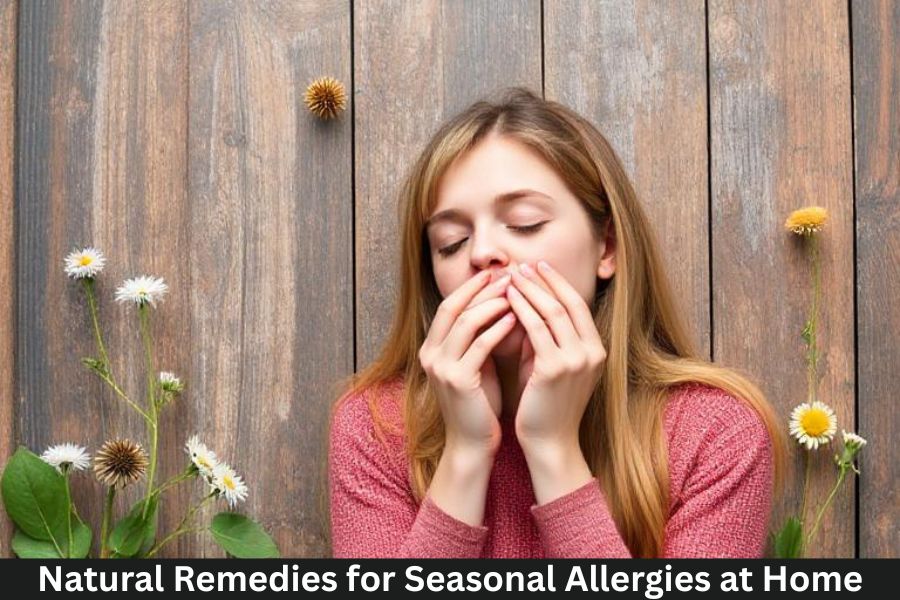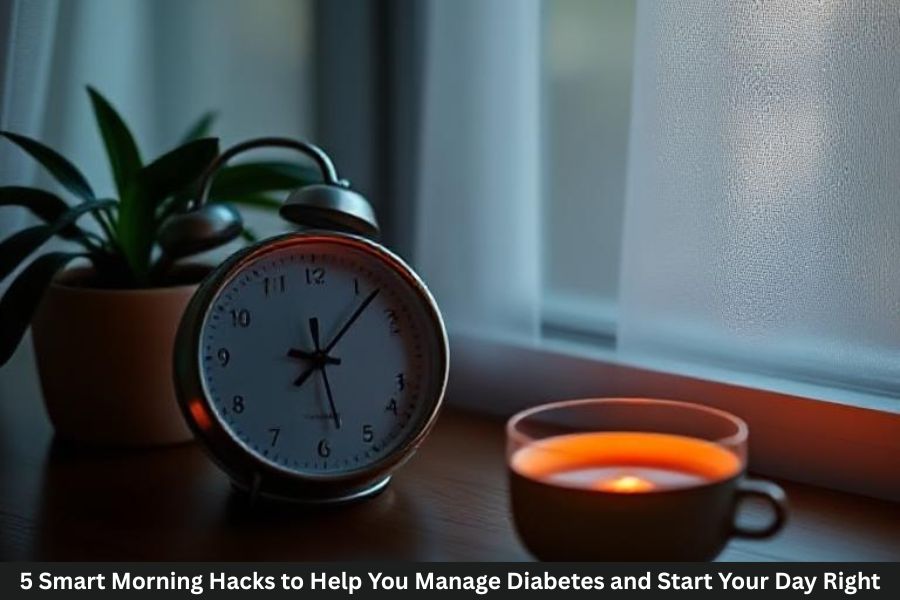Spring brings blooming flowers and fresh air—but for millions, it also means sneezing, itchy eyes, and stuffy noses. If you dread allergy season, you’re not alone. Instead of running straight to medications, there are plenty of natural remedies for seasonal allergies that you can try at home to find relief. Let’s explore how you can manage your symptoms naturally, safely, and effectively.
Understanding Seasonal Allergies
What Are Seasonal Allergies?
Seasonal allergies, or hay fever (allergic rhinitis), occur when your immune system overreacts to airborne substances like pollen, mold spores, or dust mites. Your body mistakes them for harmful invaders, triggering symptoms like:
- Sneezing
- Runny or stuffy nose
- Itchy, watery eyes
- Coughing and fatigue
Common Triggers
- Pollen from trees, grass, or weeds
- Mold spores growing in damp areas
- Dust mites lingering in bedding or carpets
- Pet dander during shedding seasons
Knowing your triggers is the first step toward finding effective natural relief.
1. Keep Your Indoor Air Clean
Use Air Purifiers
Invest in a HEPA filter air purifier to trap allergens like pollen, pet dander, and dust. Place one in your bedroom for cleaner, easier breathing at night.
Regular Dusting and Vacuuming
Use a vacuum with a HEPA filter and clean surfaces weekly to reduce allergen buildup. Don’t forget curtains, carpets, and upholstery.
Maintain Low Humidity
Keep humidity below 50% to prevent mold growth. A dehumidifier can be your best friend during allergy season.
2. Try Nasal Irrigation (Neti Pot or Saline Spray)
Flushing your nasal passages with a saline solution helps wash out pollen and mucus. Use a neti pot or saline spray daily for relief.
Tip: Always use distilled or boiled water to avoid infections.
3. Steam Inhalation Therapy
Inhaling steam opens nasal passages, reduces congestion, and soothes irritated airways.
- Boil water, pour it into a bowl, and add a few drops of eucalyptus or peppermint oil.
- Cover your head with a towel and breathe deeply for 5–10 minutes.
4. Boost Your Immunity Naturally
Eat Immune-Boosting Foods
Fill your plate with:
- Citrus fruits (vitamin C powerhouse)
- Garlic and onions (natural antihistamines)
- Leafy greens and berries (rich in antioxidants)
Stay Hydrated
Water helps thin mucus and flush allergens from your system. Aim for 8–10 glasses per day.
5. Local Raw Honey
Consuming small amounts of local raw honey may help your body adapt to local pollen over time. While research is mixed, many people swear by this sweet, natural trick.
6. Herbal Remedies for Allergy Relief
Butterbur
This herb acts as a natural antihistamine and can reduce sneezing and nasal congestion.
Stinging Nettle
Known for its anti-inflammatory properties, stinging nettle can ease allergy symptoms when taken as tea or in capsule form.
Quercetin
Found in apples, onions, and green tea, quercetin stabilizes mast cells and reduces histamine release naturally.
7. Essential Oils for Soothing Relief
Eucalyptus Oil
Opens nasal passages and eases breathing.
Peppermint Oil
Acts as a natural decongestant and relieves headaches.
Lavender Oil
Calms inflammation and helps you sleep better during allergy flare-ups.
Use these oils in a diffuser or add a few drops to your bath.
8. Apple Cider Vinegar
A tablespoon of raw apple cider vinegar in a glass of warm water with honey may help break up mucus and support immune function. Drink once or twice daily during allergy season.
9. Keep Windows Closed During Peak Pollen Hours
Pollen counts are highest early morning and late afternoon. Keep windows closed, especially when driving or sleeping, to reduce exposure.
10. Shower and Change Clothes After Going Outdoors
Pollen sticks to your skin, clothes, and hair. Rinsing off after spending time outside prevents allergens from following you indoors.
11. Manage Stress
High stress weakens immunity and worsens allergy symptoms.
Try:
- Deep breathing or meditation
- Gentle yoga or stretching
- Listening to soothing music
A relaxed body handles allergens better.
12. Drink Herbal Teas
Certain herbal teas act as natural antihistamines and anti-inflammatories:
- Chamomile tea: Calms irritation and promotes sleep.
- Green tea: Rich in antioxidants.
- Peppermint tea: Eases sinus congestion.
13. Probiotics for Gut Health
A healthy gut strengthens your immune system. Add probiotic-rich foods like yogurt, kefir, sauerkraut, and kimchi to your diet to reduce allergic responses.
14. Vitamin D and Zinc
Low levels of vitamin D are linked to increased allergy symptoms. Get 15–20 minutes of sunlight daily or take supplements with your doctor’s advice.
Zinc also supports immune regulation and recovery from inflammation.
15. Keep Bedding Allergen-Free
Wash sheets weekly in hot water, use dust-mite-proof covers, and avoid heavy comforters that trap allergens.
Conclusion
You don’t need to rely solely on over-the-counter medications to manage seasonal allergies. Nature provides plenty of solutions that work from the comfort of your home—from herbal teas and steam inhalation to probiotics and clean air. By combining these natural remedies and maintaining a healthy lifestyle, you can breathe easier and enjoy every season again.
FAQs
1. What is the fastest natural way to get rid of allergies?
Steam inhalation and nasal saline rinses offer immediate relief from congestion and sneezing.
2. Can honey really help with allergies?
Local honey may help your body adapt to regional pollen, potentially reducing symptoms over time.
3. Which foods should I avoid during allergy season?
Avoid processed foods, alcohol, and dairy if they worsen mucus buildup.
4. Are essential oils safe for allergy relief?
Yes, when used properly—always dilute with carrier oil and avoid direct skin contact if sensitive.
5. How long does it take for natural remedies to work?
Most remedies show results within a few days to weeks of consistent use, depending on your body and allergy severity.




Can you be more specific about the content of your article? After reading it, I still have some doubts. Hope you can help me.
Thanks for sharing. I read many of your blog posts, cool, your blog is very good. https://accounts.binance.com/kz/register-person?ref=K8NFKJBQ
Your point of view caught my eye and was very interesting. Thanks. I have a question for you.
Your point of view caught my eye and was very interesting. Thanks. I have a question for you. https://www.binance.com/register?ref=IXBIAFVY
I don’t think the title of your article matches the content lol. Just kidding, mainly because I had some doubts after reading the article.
Can you be more specific about the content of your article? After reading it, I still have some doubts. Hope you can help me. https://accounts.binance.info/uk-UA/register-person?ref=XZNNWTW7
Thanks for sharing. I read many of your blog posts, cool, your blog is very good.
Thank you for your sharing. I am worried that I lack creative ideas. It is your article that makes me full of hope. Thank you. But, I have a question, can you help me?
Can you be more specific about the content of your article? After reading it, I still have some doubts. Hope you can help me.
Thanks for sharing. I read many of your blog posts, cool, your blog is very good.
I don’t think the title of your article matches the content lol. Just kidding, mainly because I had some doubts after reading the article.
Can you be more specific about the content of your article? After reading it, I still have some doubts. Hope you can help me. https://accounts.binance.info/tr/register-person?ref=MST5ZREF
Thank you for your sharing. I am worried that I lack creative ideas. It is your article that makes me full of hope. Thank you. But, I have a question, can you help me? https://www.binance.com/en-ZA/register?ref=B4EPR6J0
Your article helped me a lot, is there any more related content? Thanks!
Your article helped me a lot, is there any more related content? Thanks!
Can you be more specific about the content of your article? After reading it, I still have some doubts. Hope you can help me. https://www.binance.com/fr-AF/register?ref=JHQQKNKN
Your article helped me a lot, is there any more related content? Thanks!
Your point of view caught my eye and was very interesting. Thanks. I have a question for you.
I don’t think the title of your article matches the content lol. Just kidding, mainly because I had some doubts after reading the article. https://www.binance.com/register?ref=JW3W4Y3A